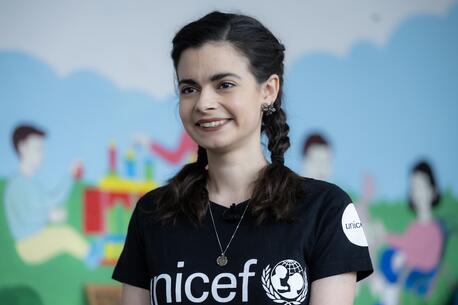Empowering youth to generate new ideas at Innovations Lab Kosovo
I recently traveled to Kosovo for the inaugural Kosovo Innovation Camp, a UNICEF sponsored, 48-hour intensive retreat that brought together 80 young people to develop six projects, from idea to business plan. The goal of UNICEF’s Innovations Lab Kosovo is threefold: to develop new solutions for some of Kosovo’s problems, empower young people to be a part of the solution, and connect them with community leaders. By these measures, the event was a huge success. Watching these young people in the room, it was easy to imagine the next Mark Zuckerberg or Sergey Brin coming from Kosovo. The participants’ ideas, ability to connect different technological solutions, and energy were contagious, and I found myself wondering how many great ideas we may have missed out on just because there was no access to a mentoring, support, and peer network such as this one.
I recently traveled to Kosovo for the inaugural Kosovo Innovation Camp, a UNICEF sponsored, 48-hour intensive retreat that brought together 80 young people to develop six projects, from idea to business plan. Working in partnership with the Social Innovation Camp and local NGOs (such as Peer Educators Network) and organizations (IPKO Foundation), the goal of the event was threefold: to develop new solutions for some of Kosovo’s problems, empower young people to be part of the solution, and connect them with community leaders. By these measures, the event was a huge success.
One of the projects, Shko Puno, addresses the high unemployment rate of Kosovo’s youth. Kosovo is the youngest nation in Europe, with 54% of the population less than 25 years old, and 75% of people aged 17-25 unemployed. In all, 45% of Kosovars are out of work. The idea is to connect students and young people who are looking for work with people who have small, part-time jobs that need taking care of. There is no culture of part-time work in Kosovo, so many small tasks, like childcare or gardening, either don’t get done or are performed by people who are qualified to do more complex work. Upon completion, Shko Puno will be a web service with a job board, a list of qualified young people looking for work, and the ability to bring these two groups together.
This type of short-term or part-time employment gives students the chance to gain experience and good references, along with the confidence that they can make positive changes in their community—all while continuing their studies. On the flip side, when these jobs get done by others, it gives parents and other qualified persons more time to tackle Kosovo’s problems, along with a new-found understanding that young people are their partners in these efforts.
The UNICEF Innovations Lab also encourages young people of Kosovo to take on long-term, holistic approaches to finding solutions to problems that include high levels of lead poisoning, pollution, a high smoking rate, and poor nutrition. In Kosovo, doing “whatever it takes” means instilling confidence in young people that with their contribution their country can become stronger and healthier.
The Innovations Lab Kosovo is at the forefront of UNICEF’s efforts to pursue low-cost, high-impact sustainable and scalable solutions that can be used not only in Kosovo, but everywhere that UNICEF works in the world. Watching these young people in the room, it was easy to imagine the next Mark Zuckerberg or Sergey Brin coming from Kosovo. The participants’ ideas, ability to connect different technological solutions, and energy were contagious, and I found myself wondering how many great ideas we may have missed out on just because there was no access to a mentoring, support, and peer network such as this one.
And who knows: maybe the next great idea to come out of Kosovo will revolutionize the way we do things in the U.S. and beyond! I have to say, I am now a believer.
Take a look at the UNICEF Innovations Lab website, and follow the Kosovo Lab on twitter and Facebook to learn more about the ideas from the Camp. Twitter accounts include: @datamiks, @inkosova, @dosthost, @bllupers, @shkopuno and @harrnoje. You might find yourself, like me, amazed.



